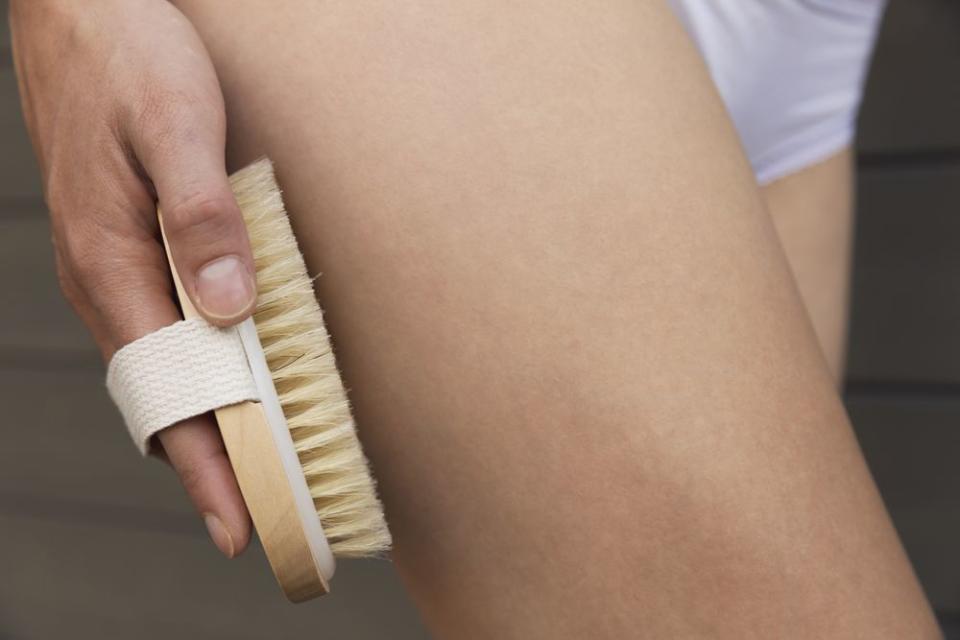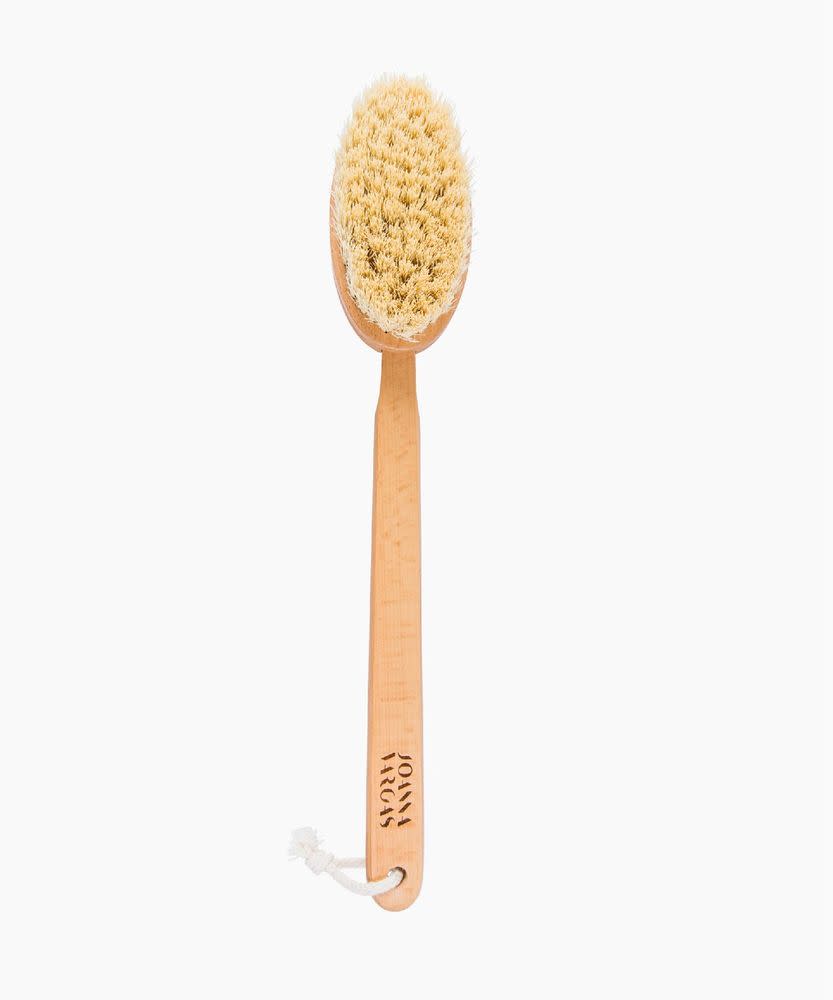Does dry brushing really do everything it claims?

Circular motions. Towards the heart. The scratchy bristles of the dry brush don’t exactly hurt, but it’s no cashmere throw. The process, however, evokes the philosophy “no pain, no gain.” Like a workout that doesn’t make your body sore the next day or a wax that doesn’t hurt, is it really doing its job if it’s not at least a little uncomfortable? Dry brushing is touted as a holistic way to exfoliate skin, decrease cellulite, and improve lymphatic drainage. How it works is that for a few minutes pre-shower, you pass the tough bristled brush lightly over almost every part of your skin, in small circular motions starting at your feet, and sweeping up towards the heart (avoid your face, breasts, and any other sensitive areas).
This technique is Goop-approved, which may make you feel either better or worse. Like most other products within the Goop world, the claims connected to dry brushing are large and when it comes to science, mostly an exaggeration. Mostly. Let’s discuss.

Does dry brushing stimulate the lymphatic system?
The loftiest-sounding claim is that dry brushing stimulates the lymphatic system. But why and how and what does this mean?
Erum Ilyas, M.D., a dermatologist at Montgomery Dermatology in Pennsylvania, explains: “The lymphatic system in our body is a system of vessels designed to absorb or remove excess fluid in our tissues. These vessels have one-way valves that prevent the backflow of fluids once entering the vessels.” So basically, it’s the system that moves liquid, fats, and white blood cells away from organs and throughout your body.
HelloGiggles also spoke to Joanna Vargas, celebrity facialist and founder of Joanna Vargas Salons and Skincare Collection, about dry brushing and how it affects the lymphatic system. Vargas says that keeping your lymphatic system in top shape can improve the look of skin. She explains:
undefined
However, Dr. Ilyas is skeptical about whether dry brushing is really necessary at all. “Perhaps by massaging out the excess fluid in our skin, dry brushing could potentially encourage the movement of fluid from our soft tissue into the lymphatic system,” she says, adding that any type of massage or manipulation of skin will stimulate the lymphatic system in the skin, but you don’t necessarily need a dry brush to do this.
If you do choose to use one, remember to brush towards the heart in an upward motion. “Blood needs to return to the heart to re-oxygenate and the lymph returns to a spot right above the heart, to clean and get nutrients,” Vargas told us.
The verdict: Yes, dry brushing stimulates the lymphatic system. But is it necessary? No, not really.

Can dry brushing reduce cellulite?
Let’s start with this disclaimer: there’s no reason you need to get rid of your cellulite, but because that’s one of the claims of dry brushing, it feels pertinent to address.
Vargas explains how dry brushing affects cellulite: “Dry brushing increases blood flow, which is healthy, but its main purpose is to stimulate collagen production which will help to thicken the skin and lessen the appearance of fat cells. It also dramatically increases elasticity, so it’s great for lifting and toning a problem area.”
So yes, dry brushing can reduce cellulite, but the reduction is only temporary, and only in appearance. Dr. Ilyas explains that massage can improve the overall appearance of cellulite by “brushing out” excess fluid. “However, dry brushing cannot get rid of the actual fat or improve the strength connective tissue fibers that have loosened to result in the actual cellulite,” she shares, “The only way to do this is to either treat the fat (via a noninvasive radio frequency fat removal or liposuction) or tighten the adhesions through subcision.”
The verdict: No, dry brushing is not a permanent solution for cellulite, though it can temporary change its appearance.
Does dry brushing exfoliate the skin?
We’ll cut to the point: If you’re going to use a dry brush, this is the reason to do so. Because of its abrasive bristles, dry brushing effectively exfoliates skin.
Dr. Ilyas thinks dry brushing can be used to make skin look a little more “polished” temporarily, like for a night out or a big event. But whether it should be done every night? “There is only a transient benefit to this process and not a long-term benefit. In fact, long term I suspect the risks of over-exfoliating or exposing our skin to excess bacteria and yeast will likely outweigh the benefits if someone decides to make this a part of their daily routine,” she says.
The verdict: Yes, dry brushing exfoliates. But maybe don’t do it every day.
So, should you dry brush?
Honestly, something about dry brushing just feels good. Those 30 seconds of self-care—of doing good for your body—sets a positive intention.
I was sent OSEA’s Plant-Based Dry Brush to try, and though I didn’t notice any immediate, dramatic change, it was the routine of dry brushing that I enjoyed most (that is, when I actually remembered to do it). Though the lack of a handle on this particular brush makes it impossible to use on my back, it felt nice. My skin is sensitive, though, and I was wary about how it would react.

If you also have sensitive skin, you might want to reconsider dry brushing. “Anyone with skin conditions such as eczema or psoriasis need to be very cautious in the affected areas so as not to cause more sensitivity. Either skip those areas or if they cover larger areas of the body then perhaps skip this altogether,” Vargas told us.
Dr. Ilyas also noted that over-exfoliating can be a bad thing: “It can lead to sensitive, inflamed skin. It can stimulate excess pigment to be deposited in the skin to lead to discoloration. If performed over open wounds, cuts or eczema, bacteria and yeast may overthrow and lead to infections.”
But barring that, you’ve got the go-ahead from an otherwise skeptic dermatologist. “I tell my patients that if they feel a benefit to skin brushing and they do not have any underlying skin conditions then it is likely harmless to do,” Dr. Ilyas says.
The final verdict? If you’re looking to reduce cellulite or dramatically affect your lymphatic system, dry brushing is not for you. But if you’re just looking to exfoliate your skin, and to spend a minute with your body, dry brush away.

